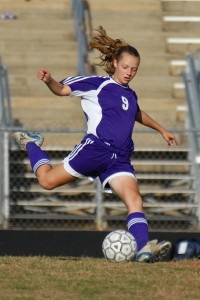Sports-Related Maxillofacial Injuries
 Whether your child plays on a formal team or she simply loves outdoor winter sports, she’s at risk of injury every time she steps onto the court, field, or ski slope. The most common injuries that come to mind include cuts, bruises, and broken bones, but your child’s face and mouth are likely targets as well. Learn what sports-related maxillofacial injuries—or injuries that affect the face and jaw—are most common and how to prevent them.
Whether your child plays on a formal team or she simply loves outdoor winter sports, she’s at risk of injury every time she steps onto the court, field, or ski slope. The most common injuries that come to mind include cuts, bruises, and broken bones, but your child’s face and mouth are likely targets as well. Learn what sports-related maxillofacial injuries—or injuries that affect the face and jaw—are most common and how to prevent them.
Common Sports-Related Maxillofacial Injuries
- Soft tissue injuries: The least severe maxillofacial injuries are also the most common. These include cuts, scrapes, bruises, and lacerations of the cheek, brow, chin, lips, and other soft tissues of the face. Usually, minor at-home care is all that’s required to help soft tissue injuries heal.
- Fractures: Facial bones can break in a fall or if an elbow or fist makes forceful contact. The most likely facial bones to fracture while playing contact sports include the cheekbone and lower jaw.
- Jaw injuries: Most blows to the face don’t result in a fractured jaw bone. However, a forceful strike to the jaw can injure the temporomandibular joint, or TMJ, and its supporting structures. This can impact the way the jaw opens and closes and result in pain while talking or chewing.
- Tooth intrusion: A particularly powerful impact may result in a tooth intrusion, which is when the tooth is driven inward toward the jaw bone. Repairing the damage may require tooth repositioning, surgery, splitting, or extraction.
- Tooth extrusion: This injury occurs when the tooth is “dislocated” from its socket but not completely knocked out. It may be possible to reposition the tooth gently and splint it so the root heals. A root canal may also be necessary.
- Cracked or chipped tooth: Minor chips result in a loss of enamel only, which affects the tooth’s appearance but doesn’t cause pain. However, if the crack extends into the dentin, temperature sensitivity can result. The most severe cracks penetrate all the way to the root and expose the tooth’s sensitive inner pulp.
- Knocked out tooth: When a tooth is knocked out, this injury is called an avulsion. Your best chance of saving the tooth is to place it back in the socket and get to Evanson DDS as fast as possible. You can also transport a knocked out tooth in a container of milk, saltwater, or saline solution. If you have a dental emergency, please call us right away at (720) 409-0008 to let us know you’re on your way. Our team will act fast to save your child’s tooth.
How to Prevent Sports-Related Maxillofacial Injuries
Clearly, some of the most detrimental face and jaw injuries that occur while playing sports involve the teeth. One way to prevent these injuries is to make sure your child wears a helmet or other face protector. Another is to have your child fitted with a custom mouth guard. This safety gear helps to prevent everything from biting the cheek or lip to displacing or knocking out a tooth. It’s certainly worthwhile to include this among your child’s other protective equipment!
The most effective mouth guards, which include those custom-made by Dr. Evanson, provide the following:
- Coverage and protection of all teeth and surrounding tissues
- Adequate thickness to absorb the force of impacts
- Tight, comfortable fit that doesn’t dislodge on impact
- No adverse effect on the ability to breathe while performing aerobic activities
Visit Dr. Evanson Today
Whether you need to have a custom mouth guard made for your child athlete or an injury on the field calls for emergency dental services, rely on Evanson DDS for all your sport-related dentistry needs. Our team has the knowledge and experience necessary to give your child the best dental care possible.
For answers to your remaining questions about sports-related maxillofacial injuries, or to schedule your next dentist appointment, please call our Parker office at (720) 409-0008 or contact us online.
Leave a reply →





